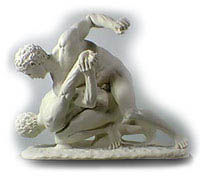Hellenization (or Hellenisation) is a historical term most widely used to describe a growing cultural influence of Hellenistic civilization. It was most prominently achieved under Alexander III of Macedon who spread Greek language, culture and religion to the lands he conquered. The result, some elements of Greek origin combined in various forms and degrees with other elements taken from conquered civilizations, is known as Hellenism.
Historic usage
A disputed modern use is in connection with policies pursuing cultural harmonization and education of the linguistic minorities resident within the modern Greek state (the Hellenic Republic) in relation to Aromanians, Arvanites, Roma, Slavophones, and the Muslim minority of Thrace. It has been suggested in connection with a statement from Greek Helsinki Monitor, arguing "Greece, like all other Balkan countries, has traditionally followed assimilatory policies and/or has discriminated against its citizens with a minority religious, ethnonational or ethnolinguistic identity. The Balkan wars of the 1910s and the First World War, along with the resulting bilateral agreements with Bulgaria and Turkey to exchange the respective minority populations, contributed to the substantial cleansing of the current territory of the Greek state from most of its non-Greek populations... acknowledging the presence of Turks, let alone Macedonians, in the country is widely perceived as a near-treason, and may lead to castigation, persecution or even prosecution of those who make such arguments."[1].
However, others point out that a number of minority groups in greece have come to be seen as integral to the modern greek narrative while still retaining a degree of separate identity, attested to, this view highlights , by the persistence of Greek-Vlach public organisations and the avowedly greek/vlach and greek/arvanite status of several heroes of the country's popular narrative.
Alexander the great was a Greek emperor who conquered almost all the world. In his period of government he created Hellenization. Hellenization was a historical term most widely used to describe a growing cultural influence of Hellenistic civilization. Alexander invented the commercial cities and multiplied them throughout his empire and developed a transportation network to support commerce. It allowed him to receive supplies for his conquering projects anywhere in the world in an early version of globalization. Alexander practiced respect for local cultures. Conquered nations paid tributes but they absorbed only what they wanted from Hellenistic culture.

 Modern usage
Modern usageDe-Hellenization (or De-Hellenisation) is another complex and debated term used to describe a cultural change in which something Greek becomes non-Greek (non-Hellenic). The process can either be voluntary, or, commonly, applied with varying degrees of force.
Through history, the term has been used in connection with the Islamization and eventual Turkification of some Greek populations in the Ottoman Empire, beginning with inhabitants of eastern thrace, and also of the slavicised Greek inhabitants in the Balkans (see Slavophone Greeks) , while the Aromanians of greece stress links with the country , numbering at least 84 Vlach associations around its localities. (the membership of the Panhellenic Federation of Cultural Associations of Vlachs) [2], [3].
In recent times, it has sometimes been used in connection with the Second World War and the triple occupation of Greece [4], Enver Hoxha's regime in Albania [5] (a country with a large Greek minority in the southern part of the country) [6] and with the Greek Muslims.
De-Hellenization
Re-Hellenization (or Re-Hellenisation) is a further debated term used to describe a cultural change in which something which had been originally Greek, becomes Greek again, after a period of time in which it was not Greek (De-Hellenization). The process can either be voluntary, or applied with varying degrees of force.
The term is used in a number of contexts, regarding the re-hellenization of the southern Slavic population in the Balkans. Arguably, the term can be used for the Kalasha tribe in Pakistan, that claims descent from the Greeks of Alexander the Great, and where Greek volunteers (with the help of the Greek government) have built 5 schools.[7]. The Vlachs of Greece (Aromanians and Megleno-Romanians) are another group associated with disputed origins. The Panhellenic Federation of Cultural Associations of Vlachs (Πανελλήνια Ομοσπονδία Πολιτιστικών Συλλόγων Βλάχων), a federation of at least 84 Vlach associations located throughout Greece, staed on the 28th February 2001 : we, the Vlach-speaking Greeks ,do not request recognition from outside as a minority because both historically and culturally we were and are an integral part of the Greek nation [8]. Other Vlach associations (from Romania, Albania, Republic of Macedonia, and especially those from the Diaspora) reject a Greek origin for Aromanians and Megleno-Romanians. The existence of Vlachs in Albania professing a Greek identity has been reported : they are often invited by Vlachs of Greece to festivals, and receive assistance from greek-vlachs to improve living standards, while vlachs in the republic of macedonia do not express a greek identity.

No comments:
Post a Comment